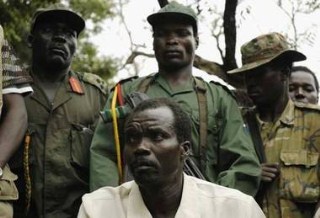US congress passes reward legislation to capture LRA leader
June 28, 2012 (JUBA) – Legislation that focuses on international criminals and combating human rights abuses was on Wednesday unanimously passed by the US Congress members on the House Foreign Affairs committee.

If signed into law, the rewards program would reportedly be expanded to also target transnational organised crime and those wanted for the most serious human rights abuses.
“Targeting those who assist terrorists and drug cartels with weapons, sophisticated forgeries, and money laundering is just as important as targeting the organizations themselves. A rewards program in this area can help disrupt these transnational organized crime networks,” said Royce, who chairs the House Foreign Affairs Subcommittee on Terrorism, Nonproliferation, and Trade.
“Critically, the language included allows the rewards program to target those who are wanted for genocide, war crimes or crimes against humanity — the world’s worst human rights abusers,” added Royce in his statement.
Joseph Kony, the elusive leader of the notorious Ugandan rebel group; the Lord’s Resistance Army (LRA) is considered the main target of the newly passed legislation. “Target one is Joseph Kony, the sadistic head of the LRA. U.S. military advisors working in Central Africa consider a reward offer on Kony as critical to their effort. They need this tool in the field now,” said Royce.
Formed in Uganda in the late 1980s, the LRA rebels have, for over 15 years, mainly targeted innocent civilians and the army. However, following regional armies’ offensive, the LRA moved to neighbouring countries and killed, abducted, mutilated, raped and displaced thousands of people.
The United Nations department for peacekeeping operations estimates that the LRA is now down to less than 500 combatants operating under Kony’s leadership. But its capacity to attack, terrorize and harm local communities remains of grave concern.
Early this year, a senior State Department official, in a testimony before the Foreign Affairs Subcommittee on Terrorism, Nonproliferation, and Trade reportedly said the newly passed legislation was “critical” in efforts to locate Kony.
The US Defense Department, in a letter earlier this month, reportedly said the rewards program will “provide the Combatant Commander and Chief of Mission with relatively low-cost and effective tools to achieve national security objectives.”
At the end of 2011 the US sent 100 troops to assist local forces in tracking Kony down. The exact details of their assistance remain unclear for strategic reasons.
Uganda, South Sudan, Central African Republic and Democratic Republic of Congo set up a 5,000 strong force under the African Union in March to track down Kony. However, most of the troops are yet to be deployed and “These troops lack almost everything: they lack boots, they lack uniforms, they lack food rations and they sometimes lack training. So there is a need for these things to be supplied that make a difference on the ground,” according to Francisco Madeira, AU special envoy on the LRA.
Senator Royce, a former chair of the Africa Sub-committee, is also credited for having led Congressional efforts to see that international arms dealer Viktor Bout, arrested in Thailand in 2008, was extradited to the US to stand trial.
In 2010, Republican lawmaker was reportedly the original sponsor of the Lord’s Resistance Army Disarmament and Northern Uganda Recovery Act; the law that paved way for the policy of the US to “apprehend or remove Joseph Kony and his top commanders from the battlefield.”
Meanwhile, since the program’s inception in 1984 under ex-President Ronald Reagan, the US government has reportedly rewarded over 70 people who provided actionable intelligence that, according to the State Department, prevented international terrorist attacks or helped convict individuals involved in terrorist acts.
(ST)
